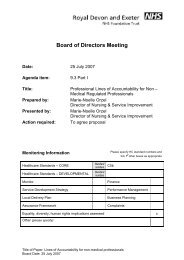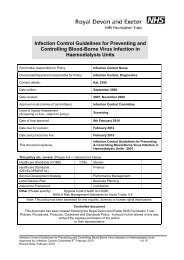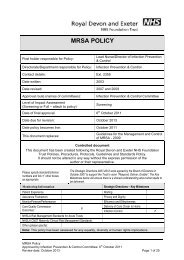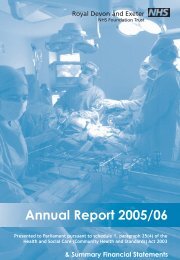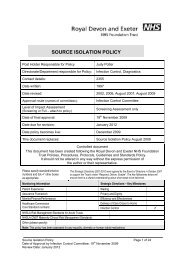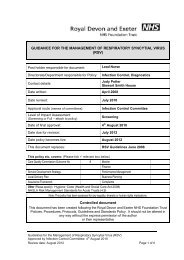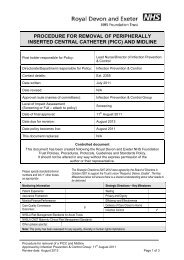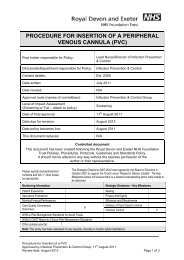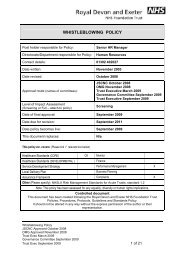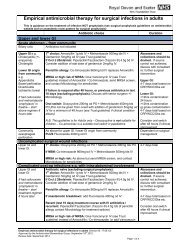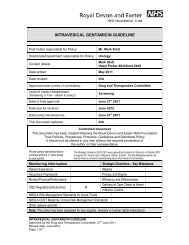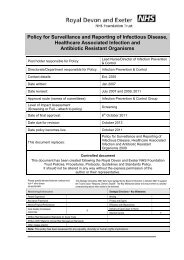Annual Report and Accounts 2012/13 - Royal Devon & Exeter Hospital
Annual Report and Accounts 2012/13 - Royal Devon & Exeter Hospital
Annual Report and Accounts 2012/13 - Royal Devon & Exeter Hospital
Create successful ePaper yourself
Turn your PDF publications into a flip-book with our unique Google optimized e-Paper software.
108 5. Our Governors <strong>and</strong> Members<br />
<strong>Royal</strong> <strong>Devon</strong> <strong>and</strong> <strong>Exeter</strong> NHS Foundation Trust<br />
<strong>Annual</strong> <strong>Report</strong> <strong>and</strong> <strong>Accounts</strong> <strong>2012</strong>/<strong>13</strong><br />
The role of<br />
Governors following<br />
the Health & Social<br />
Care Act <strong>2012</strong><br />
The <strong>2012</strong> Act confirmed that the<br />
Council of Governors has a duty to hold<br />
the Non-Executive Directors, individually<br />
<strong>and</strong> collectively, to account for the<br />
performance of the Board of Directors.<br />
It also has the duty to represent the<br />
interests of the Members <strong>and</strong> the<br />
public. Additional rights <strong>and</strong> powers,<br />
including approving any application to<br />
enter into a merger or acquisition <strong>and</strong><br />
the approval of any proposed increase<br />
in private patient income of 5% or<br />
more in any financial year, were also<br />
contained in the Act.<br />
Over the course of the year the<br />
Governors considered the statutory<br />
powers contained within the new Act<br />
<strong>and</strong> looked at its current practices to<br />
see if they were compliant with it; or<br />
whether additional modifications were<br />
required to ensure that the clarified<br />
powers were being enacted. This process<br />
involved a negotiated outcome with the<br />
Directors at a joint development day.<br />
In agreeing an initial overview of how<br />
the powers would be enacted, both the<br />
Governors <strong>and</strong> Directors stressed that<br />
any agreement would need to be subject<br />
to regular reviews to ensure that it was<br />
fit for purpose.<br />
The following overview provides<br />
the key elements of the agreement<br />
between the Governors <strong>and</strong> Directors<br />
about how the directions set out under<br />
the Act would be taken forward. In<br />
some areas, it was agreed that current<br />
practice was sufficient; in others it<br />
was felt that current practice needed<br />
to be tweaked or more substantially<br />
amended; in others, it was agreed<br />
that a new approach needed to be<br />
established.<br />
Accountability for the<br />
performance of the Board<br />
Holding the Non-Executive Directors,<br />
individually <strong>and</strong> collectively, to account<br />
for the performance of the Board of<br />
Directors is a new statutory duty for<br />
the Council of Governors.<br />
Although the 2006 Act does not<br />
directly refer to accountability between<br />
the CoG <strong>and</strong> Board, the current<br />
Monitor Code of Governance (pre<br />
<strong>2012</strong> Act) interprets this element of<br />
the role of the CoG to be:<br />
“The Board of Governors should hold<br />
the Board of Directors to account for<br />
the performance of the Trust, including<br />
ensuring the Board of Directors acts<br />
so that the Foundation Trust does not<br />
breach the terms of its authorisation.”<br />
The main differences are:<br />
• The establishment of a statutory<br />
duty for Governors rather<br />
than advice. This suggests that<br />
Governors must now legally fulfil<br />
this duty<br />
• The CoG exercises its<br />
accountability duty in relation to<br />
individual NEDs <strong>and</strong> the wider<br />
Board. The NEDs must account to<br />
the CoG for the performance of<br />
the Board<br />
• The accountability is focused on<br />
the performance of the Board<br />
rather than the performance of<br />
the Trust.<br />
The Act clarifies that the accountability<br />
relationship concerns the performance<br />
of the Board in carrying out its duties<br />
rather than the performance of the<br />
Trust as a whole.<br />
This will help to avoid, though not<br />
eradicate, the idea that Governors<br />
oversee the performance of the Trust<br />
in the way that Directors are legally<br />
obliged to do.<br />
This is, as mentioned earlier, consistent<br />
with the work that Governors have<br />
been involved with at the Trust over<br />
a number of years in better defining<br />
their role.



